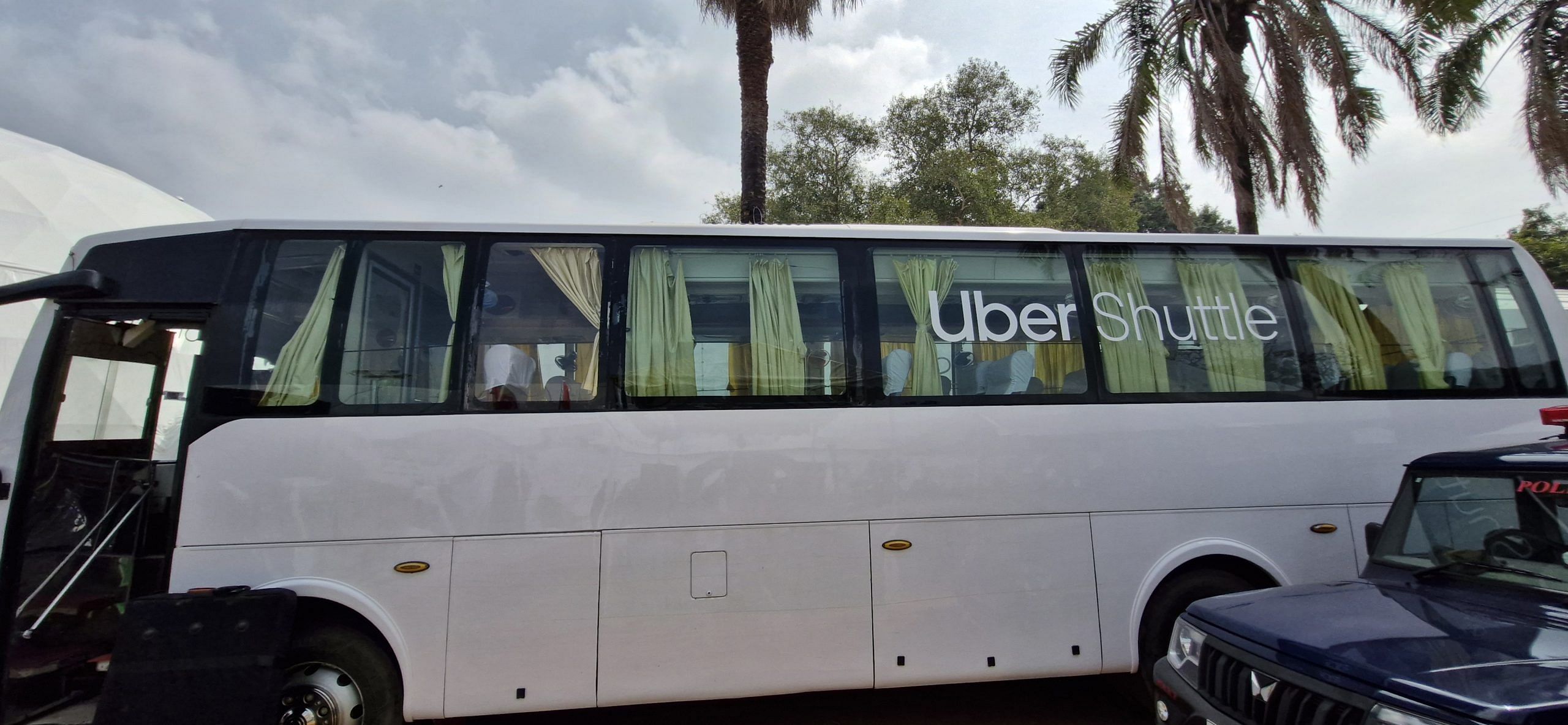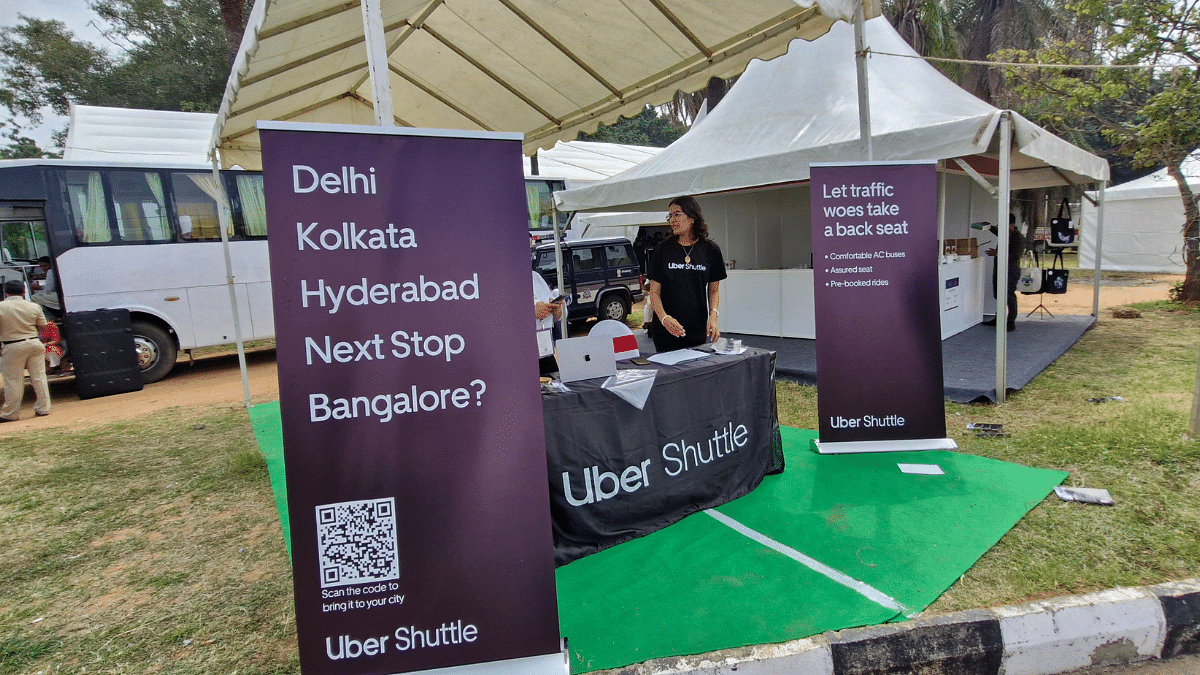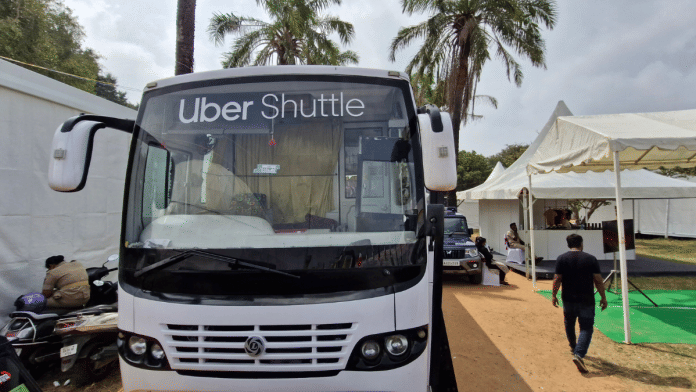Bengaluru: Uber is trying to drum up public support for its bus ride service in Bengaluru, where this is currently illegal as the Karnataka government does not allow any competition to state-run, intra-city buses.
The company has set up a stall in the ongoing Bengaluru Tech Summit (BTS) to convince people about the efficacy of its latest offering to India’s IT capital—the Uber Shuttle or a private-shared service.
The “advocacy engagement” initiative aims to give the people of Bengaluru a “touch and feel” of the resource which Uber believes will decongest roads.
From a premium space outside, the covered chalets of the BTS, company officials conducted an online survey, asking anyone who approached them three questions—what is their mode of transport, what challenges do they face during their daily commute and would they “support the introduction of Uber Shuttle in Bengaluru”.
The San Francisco-based company, which has operationalised the buses in Delhi, Kolkata and Hyderabad, hopes that positive public opinion would pressure the government to soften its stance, or change policy.
An official said the only state which has rules for aggregating buses is Delhi. “In Kolkata we are operating through an MoU with the state government. But it is tricky in Bengaluru and Karnataka… unless there are rules, the government finds it difficult to agree to a player like Uber to aggregate buses,” he added, requesting anonymity.
While successive state governments in Karnataka have encouraged endearing monikers like “start-up hub” and “technology capital” for Bengaluru, a legal framework to support these aspirations is still lagging.
With no specific policy governing the space, Uber’s announcement in October to start Uber Shuttle in Bengaluru is caught in uncertainty. Can it operate without being penalised or will the state draft laws to catch up such “disruptors” and embrace innovative solutions to decongest the city?

Also read: Bengaluru, Mumbai among top 10 Asia-Pacific cities which saw highest rise in home prices in 2023
Technology has raced past policy
Uber Shuttle is a 35+ seater bus service on a specific route in which unrelated riders or customers can book a seat, be picked up from various locations and be dropped off at their respective destinations. The company says this will negate the need for personal transport and save an uncomfortable ride in overcrowded state-run buses.
During the launch of Uber India Impact Report 2024 in October, President of Uber India Prabhjeet Singh had said the company was in talks with various stakeholders to at least start operations along Bengaluru’s 18-km technology corridor between Silk Board and K.R. Puram. However, that too has made no headway.
Karnataka’s Information Technology and Biotechnology (IT/BT) Minister Priyank Kharge told ThePrint that state policy could never catch up with innovations across the globe. He cited the example of the European Union grappling with AI and space technology regulations.
“There are going to be disruptors in every sector… Ola, Uber. But there are many things that do not fit into the policy fold. That does not mean that the tech is bad,” Kharge added.

Compulsions of vote-bank politics?
In 2016, the Karnataka transport department cracked down on Zipgo, a Bengaluru-headquartered start-up that offered the same services as Uber Shuttle. This indicated that regulators would not tolerate private players operating a “contract carriage” (rented or contracted by one person or party to ferry people) as a “stage carriage” (stopping to pick up unrelated passengers).
Even today, two-wheeler taxis are not allowed in Bengaluru though there is no policy that makes them illegal. This has led to tension between auto drivers who fear a further dent in their incomes, and bike-taxi riders who believe they have just as much right to making money.
The government has tried to balance expectations on both sides as auto drivers form a significant constituency, while the gig economy is not considered a homogeneous group or a “voting block”, experts said. At least, not yet.
Sreedhar Prasad, former partner with KPMG and an internet business expert, told ThePrint: “One policy that got approved created a lot of livelihood for people in the mobility space, many drivers too migrated to Bengaluru with the opportunity. Any further policy on mobility would need to factor in the impact to the current revenue earners. We need to find a balance as it is tricky from the point of view of a policy maker.”
A decade ago, the rise of ride-hailing cab services like Ola, Uber and TaxiForSure, or even e-commerce giants like Flipkart and Amazon faced stiff resistance from traditional non-app or offline operators in Karnataka and other parts of India.
There is a ban on app-based, car-pooling in Bengaluru which the government justifies from the point of view of safety and accountability. This, however, has killed one of the easiest and most cost-effective solutions to unclog the city’s roads.
Also, there is still no clarity in the state if technology companies like Ola, Uber and Rapido come under the IT/BT department or the transport department. Nor is there any intersection that addresses these challenges, experts said.
(Edited by Tikli Basu)
Also read: Cash-strapped Karnataka govt considers reviving plan to develop satellite towns around Bengaluru







Keep the route as destination from one company to other instead of normal bus stand. Let the stop of these shuttle be inside major companies in ORR. Issue tickets accordingly.
The duplicity of the government is in full display here. Anybody should visit Bangalore during the evening after office hours. There are plenty of private buses and mini buses which ply to pick up the extra rush. Govt run buses are woefully short. While the private buses and mini buses happily charge customers in the name of providing them a seat. No bill is provided either. Government knows that it will lose its ability to earn easy commission money under the table once this part is regulated.